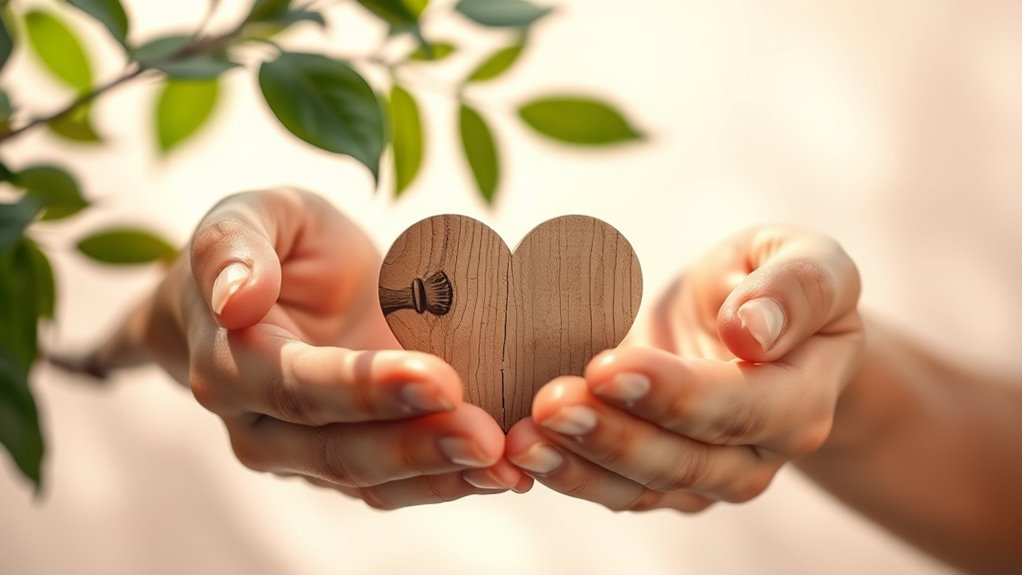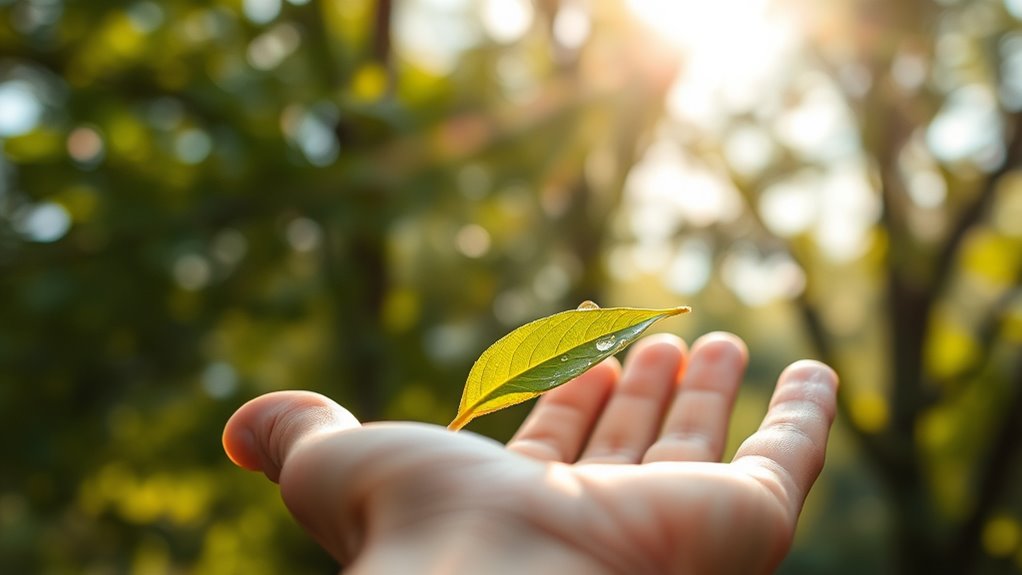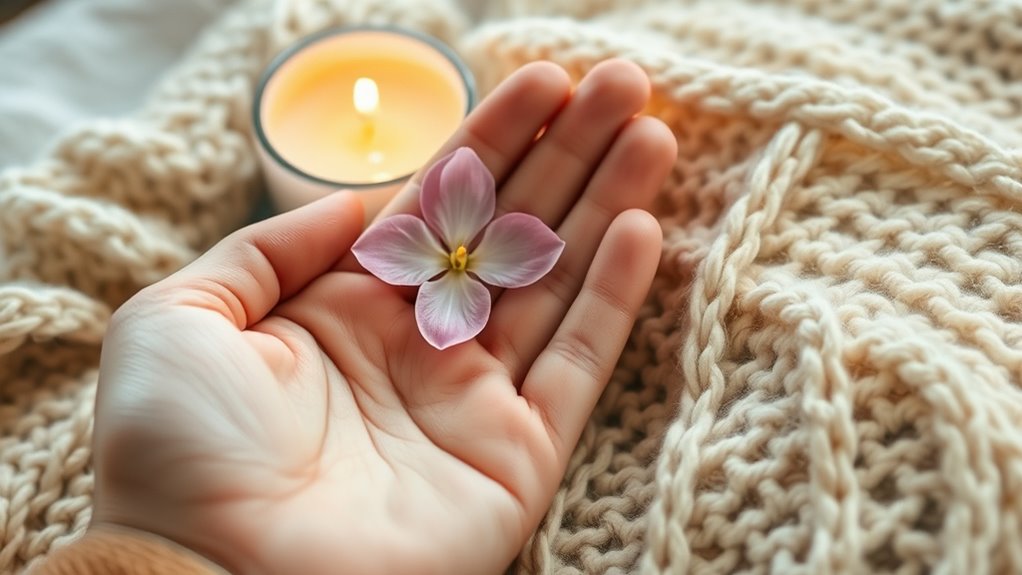Self-compassion has three key parts. First, be kind to yourself and treat mistakes with gentle understanding instead of harsh criticism. Second, recognize that everyone faces struggles, which helps you feel connected and not alone. Third, practice mindfulness by staying present without judgment, observing your thoughts and feelings calmly. Combining these components can boost your resilience and well-being. Exploring each aspect further can help you develop a more compassionate relationship with yourself.
Key Takeaways
- Self-kindness involves treating oneself with compassion, especially during mistakes or setbacks, rather than self-criticism.
- Common humanity recognizes that suffering and struggles are universal, fostering empathy and connection with others.
- Mindfulness entails paying deliberate, non-judgmental attention to present experiences with gentle awareness.
- The three components work together to promote emotional resilience and a supportive inner dialogue.
- Cultivating these components through practices like meditation and compassionate awareness enhances overall well-being.
Understanding Self-Kindness

Understanding self-kindness means treating yourself with the same compassion and care you’d offer a friend. It involves avoiding self-criticism, which can undermine your emotional resilience. Instead of harsh judgments, practice gentle understanding when you make mistakes or face setbacks. This approach helps you build emotional strength because you learn to respond to yourself with patience rather than blame. When you’re kind to yourself, you’re less likely to ruminate on failures and more likely to recover quickly. Cultivating self-kindness encourages a supportive inner dialogue that nurtures your well-being. Over time, this fosters greater emotional resilience, making it easier to handle life’s challenges with grace and confidence. Remember, self-kindness isn’t about perfection but about caring for yourself through all circumstances. Additionally, incorporating gentle practices like mindfulness or self-exploration can further reinforce your resilience through proven methods, and understanding the importance of skin care ingredients in your self-care routine can enhance your overall well-being. Recognizing how sound vibrations influence your emotional state can also support your self-compassion journey, especially when harnessed with scientifically supported techniques.
Embracing Our Shared Humanity

Recognizing that everyone makes mistakes and faces struggles helps you see that you’re not alone in your imperfections. When you embrace your shared vulnerability, you understand that suffering and setbacks are universal experiences. This awareness fosters a sense of collective empathy, reminding you that others face similar challenges. By seeing your struggles as part of the human condition, you soften self-criticism and cultivate compassion—not just for yourself but for others as well. Embracing our shared humanity helps you connect on a deeper level, realizing that imperfection is part of being human. It encourages you to extend kindness and understanding beyond your own experiences, fostering a sense of belonging and resilience that can support you through difficult times. Additionally, understanding the importance of AI in Education highlights how technology can be used to support personalized growth and empathy in learning environments. Recognizing the role of biodiversity in connected ecosystems can further deepen your appreciation for the interconnectedness of human experiences and the natural world. Cultivating an awareness of interconnectedness can strengthen your sense of community and shared purpose, highlighting how essential oils can be used to support holistic well-being and resilience. Developing an understanding of relationships can also enhance your capacity for empathy and mutual support in both personal and communal contexts.
Cultivating Mindfulness

Cultivating mindfulness involves intentionally paying attention to the present moment without judgment. By developing mindful awareness, you learn to observe your thoughts, feelings, and bodily sensations with compassionate acceptance. This ongoing practice encourages a gentle curiosity about your experiences, fostering mindful curiosity that can deepen your understanding. To deepen your understanding, consider the following aspects:
| Aspect | Explanation |
|---|---|
| Mindful Awareness | Paying close attention to your experiences moment-to-moment. |
| Compassionate Acceptance | Embracing each experience with kindness, without self-criticism. |
| Consistent Practice | Regular mindfulness exercises enhance self-awareness. |
Focusing on these elements helps you foster a non-judgmental attitude, making self-compassion a natural part of your daily life. Additionally, integrating mindfulness exercises into your routine can enhance your overall well-being. Practicing emotional regulation through mindfulness can also support mental health and resilience. Understanding the importance of self-awareness in cultivating compassion can further deepen your practice.
Frequently Asked Questions
How Does Self-Compassion Differ From Self-Esteem?
When you ask how self-compassion differs from self-esteem, think about self-esteem as feeling good about yourself based on comparison and achievements, which can fluctuate. Self-compassion, on the other hand, centers on your self-worth versus external validation. It involves kindness and understanding, especially during setbacks, fostering resilience. Unlike self-esteem, it isn’t tied to success or others’ opinions but nurtures a steady sense of value from within.
Can Self-Compassion Improve Mental Health Over Time?
Did you know that regular mindfulness practices can boost emotional resilience and improve mental health? Yes, self-compassion plays a key role here. By practicing kindness toward yourself and accepting imperfections, you reduce stress and negative emotions over time. This consistent self-care helps build emotional resilience, leading to better mental health. So, yes, cultivating self-compassion can markedly enhance your well-being and mental clarity as you face life’s challenges.
Is Self-Compassion Effective Across Different Cultures?
You might wonder if self-compassion works across different cultures. Cultural perspectives influence how kindness to oneself is viewed, making cross-cultural applications vary. In some societies, self-compassion is embraced as a way to promote mental health, while others may see it as self-indulgent. Overall, research suggests that cultivating self-compassion can be effective worldwide, but understanding cultural nuances helps tailor approaches for greater acceptance and impact.
How Can I Practice Self-Compassion During Stressful Situations?
When life gets overwhelming, take a moment to enjoy a gentle pause. Practice mindful breathing to center yourself and slow racing thoughts. Use compassionate self-talk to treat yourself with kindness, acknowledging your feelings without judgment. Remind yourself that it’s okay to struggle and that you’re doing your best. These simple steps can help you navigate stressful situations with more patience and understanding, easing your mind and restoring your inner balance.
What Are Common Barriers to Developing Self-Compassion?
You might find it hard to develop self-compassion because of self-critical tendencies that make you judge yourself harshly. Fear of vulnerability can also hold you back, as opening up feels risky. These barriers keep you from being kind to yourself and accepting imperfections. To overcome them, try practicing gentle self-talk and gradually sharing your feelings, which can help you build a more compassionate relationship with yourself.
Conclusion
As you practice self-compassion, imagine yourself tending a garden. Each part—self-kindness, shared humanity, and mindfulness—is like watering, nurturing, and weeding. When you’re gentle with yourself, even amid mistakes, you create space for growth. Remember, just as a garden flourishes with care, your well-being blossoms when you embrace these components. By tending to yourself with kindness and awareness, you’ll find resilience blooming in every season of life.









